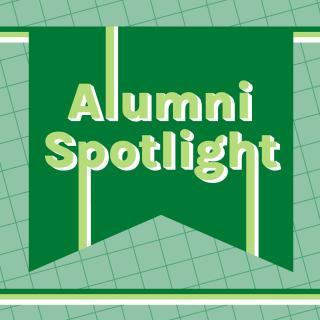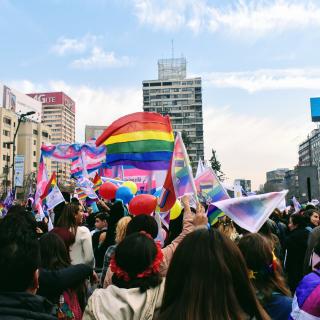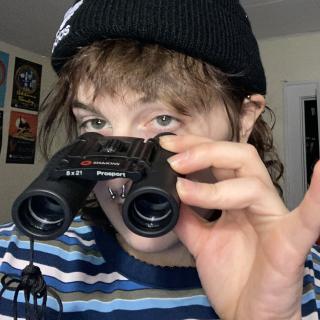Following a semester studying abroad in Europe, an IES Abroad student was ready to take his cultural understanding and French language abilities to a new a level by studying abroad in Rabat.
In the interview below, this student shares about his experiences in Morocco learning French and Arabic, living with a host family, meeting people, and dating.
The student self-identifies as an Asian queer man. He has graciously agreed to share about his experiences, though he has chosen to do so anonymously, as homosexuality is illegal in Morocco.
IES Abroad: How did you decide to study abroad in Morocco?
Anonymous: I’ve been learning French since my freshman year in college, and I wanted more practice. I already decided to study abroad in Europe for one semester, so I didn’t want to spend an entire year abroad only in Europe. Rather, I wanted to go somewhere different and somewhere I had very little knowledge of. Browsing through the list of programs, I found that the program in Rabat offers courses in French and Arabic. I’m pretty good at learning languages, so I thought it’d be cool to learn Arabic too.
IES Abroad: Before studying abroad, what did you expect your experience to be like in Morocco?
Anonymous: I honestly didn’t know what to expect because I simply didn’t know a lot about it. Some people told me it’s a bit dangerous. My French professor just told me “please don’t catch the Moroccan accent when you come back.” I thought I would definitely be fluent in French by the end of the semester.
I guess I was just picturing a Middle Eastern-ish city with street signs in Arabic everywhere in the city, probably very dry as well. I’ve heard of the Sahara Desert throughout childhood, so it was exciting to actually have the opportunity to visit.
I have an East Asian friend who spent one semester in Rabat as well and she told me some Moroccan men just followed her as she was walking through the old city because she looked exotic and they were curious, and therefore I did expect that people would think I’m very exotic.
I knew homosexuality is illegal and so is same-sex marriage, so I expected Morocco to be very heteronormative. It’s hard to articulate all my previous expectations at this point because I’ve been through the whole experience so my expectations listed here might not be exhaustive.
IES Abroad: Was your experience different than your expectations?
Anonymous: Yes and no. I did feel that I looked exotic in Morocco; sometimes Moroccans catcalled me but without sexual intentions. I felt pretty safe in Morocco as a cisgender man, and I did a lot of solo travels, whereas other girls in the program were scared to walk alone at night.
It was really eye opening, too, to witness the diverse landscapes in Morocco.
I’m not yet fluent in French, and I feel that fluency in one language does not just happen right away by language immersion. It requires a lot on the learners to actively accumulate new vocabulary and expressions.
It actually surprised me that we have public baths, the hammams, in Rabat because it sounds a bit homoerotic to me with all the people of the same sex being naked and scrubbing each other in a public bath, especially considering that a lot of homophobic people in the United States probably won’t be comfortable with it.
I was also very surprised by the Moroccan hospitality. In Morocco dialect, you can call any stranger khoya, my brother, or kheti, my sister. However, there’s an interesting qualification where some Moroccans may suddenly despise you upon knowing that you’re queer.
IES Abroad: Tell us about your experience living with a Moroccan family.
Anonymous: I actually lived with two Moroccan families, one in Meknes during orientation and the other in Rabat for the rest of the semester. It was a bit of a struggle because I didn’t speak French well enough to communicate without any problems, but the whole experience definitely made me more comfortable speaking French. Now I’m taking a class on French history and society taught in French, I almost understand everything, but it was very mentally exhausting at first.
I can tell that my host family really likes me, but I also feel that their affection comes with certain qualifications. For example, I think the dynamics will be a bit weird once they know I’m queer. In our everyday conversations, they’ve always jokingly asked me how many wives or kids I want. I feel that the whole situation would be very weird if I said, “No I actually like boys.”
IES Abroad: So much of study abroad happens outside of the classroom. What was it like meeting people and traveling?
Anonymous: I really enjoyed getting to know the locals and practicing Arabic and/or French, whether with people that I met [while traveling], the university students that I took a class with, or just random people in the street or on the beach. Sometimes I enjoyed that I looked exotic in Morocco because when people stared at me out of curiosity, to me personally, it became an easy way to start a conversation. I liked most people that I met, but still, I felt the need to hide my queerness at all times.
IES Abroad: You’re particularly well-traveled and have lived in multiple countries. How does Morocco compare to these other places?
Anonymous: The hospitality here is just amazing, definitely unrivaled compared to other countries I’ve lived in. But as I’ve mentioned several times, I also feel that the hospitality comes with qualifications as well. They welcomed me because they love having tourists visit them, and I knew a lot of slang words in Moroccan Arabic. But I wonder how different things would be if they knew I’m queer.
I’ve had one experience where, a guy was super friendly and calling me khoya, my brother, all the time, like all Moroccans do. But as soon as he found out I’m queer, I just suddenly became “gross.”
IES Abroad: What would you like to tell other students about life in Morocco as a queer student?
Anonymous: The IES Abroad Student Affairs Coordinator said during orientation that Moroccans generally don’t talk about homosexuality; if one person in the family is gay, and maybe the whole family knows it, nobody is going to talk about it. Same thing with the IES Abroad students: if you’re queer, refrain from talking about it with your host families. You don’t even have to be out in your program; most of the time nobody really asks you about your sexuality. One really has to try hard to maintain an alternative, non-heteronormative community outside the program itself.
IES Abroad: Has your experience in Morocco changed how you view yourself as a queer student of color? In what ways?
Anonymous: My semester abroad in Morocco is really when I started to unlearn the racial inferiority I’ve internalized. I go to a majority white and upper class campus with students mostly from wealthy families in California and New York. To be brutally honest I thought I was very ugly and undesired, and I was so scared to have pictures taken. When I looked at photos of myself I genuinely, genuinely felt that I looked very ugly. I used to wonder, why aren’t I as attractive as those white guys? Why is my hair so spikey? Why is my nose so flat?
My semester in Morocco was not as U.S.-centric or Euro-centric as my home school in the United States. The program, though not absolutely diverse, was relatively a lot more diverse than my program the previous semester in Europe, though I was still the token person that professors called upon.
I guess my mindset also changed as I started dating some Moroccan guys. While it’s hard to meet other queer people organically, I got really close with one guy who studied abroad in the United States for one semester. He told me he thought I was really attractive. I was really surprised because, I guess, I was used to being called ugly. I told him white people think I’m ugly, and he told me “no, but you’re not.” It was then that I started to think how people think differently because of their backgrounds. That white people think I’m ugly doesn’t mean I am.
Many thanks to this student in sharing his authentic study abroad experience.
Check out study abroad blog posts from the LGBTQ+ community and browse our LGBTQ+ & Ally Resources.
Are you interested in speaking with a recent alumni about their experiences identifying as LGBTQ+ while studying abroad? Email study@IESabroad.org to be put in contact with an IES Abroad Ambassador.





